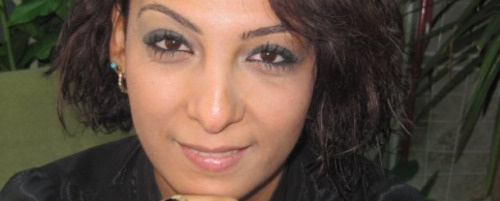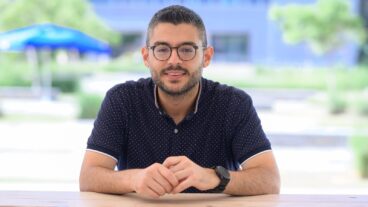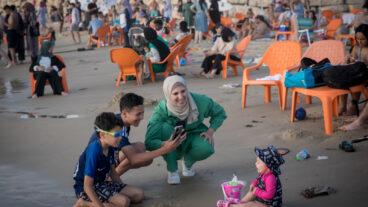Palestinian Arab Israeli Hanan Gaffaly experienced a spiritual and professional metamorphosis on the road to becoming a peacemaker.

Real peacemakers are often the quiet ones, like Hanan Gaffaly – who works at the NGO Kids Creating Peace and volunteers for Sulhita, an NGO that brings together Palestinian and Israeli youth. Thousands of peacemakers like Gaffaly are not high profile activists like Ghandi and Martin Luther King were. They work from deep within, starting with themselves and their communities, and move on to take small, bold steps to influence the ‘big picture.’
ISRAEL21c first met Gaffaly, a 34-year-old Israeli Arab woman from the city of Jaffa near Tel Aviv, while at a San Francisco-based United Religions Initiative conference. At the annual meeting, held in Madaba, Jordan in December, which brought together different faiths from the Middle East-North Africa region, she sat with Elad Vazana, director of the Sulha Peace Project, an Israeli-Arab peace organization that also runs the Sulhita youth NGO, and proffered her personal story.
Palestinians, Israelis and the world at large fail to comprehend how uncomfortable it is for Gaffaly a “Palestinian Arab Israeli” who feels wedged in a major cultural rift in the Middle East. On one hand she identifies herself strongly as an Israeli, but at the same time she has Palestinian relatives with whom she empathizes. They don’t understand why she can’t do more to alleviate their plight, she tells the group of about 60 people.
Gaffaly’s journey as a peacemaker began about three years ago, when she embarked upon a process of working deeply on herself. The Nazareth-born mother of two boys describes herself thus: “I am a Muslim and my family is very religious. My sister, my parents and bigger brother went to Hajj.” She cites the Muslim pilgrimage as a yardstick for her family’s commitment to Islam.
Shedding her headscarf for a new reality
Around three years ago Gaffaly made a radical change in her life when her unhappy marriage led her to get a divorce. And along with her marriage, she shed her religious head covering. Following her participation in Strive Israel, a government-sponsored course, the high-school graduate entered the workforce as a secretary.
“I have my own journey, and was religious for five years. I was in Mecca. But since my divorce I chose another journey in my life. There was a theme, and it didn’t work. When I decided to get a divorce, I decided to work and study,” she says. “One of the reasons that I took off the religious clothes was that I needed to work and it wasn’t simple. Big changes happened quickly.
“My focus was to believe in myself that I could find work that I can develop in, that I can prove myself,” she tells ISRAEL21c.
The foray into the peacemaking world began after Gaffaly attended a Sulha gathering, an annual event that seeks to bring together Jews, Muslims and Christians from Israel and the West Bank and Gaza in a several-day interfaith meeting of minds. Gaffaly liked the idea and as she is proficient in both Arabic and Hebrew, she offered to be a translator. She is now on the Sulha board and works actively with its sister chapter, Sulhita, which brings together dozens of Israeli and Palestinian youths every year.
The world of social involvement resonated within Gaffaly. Eight months ago she landed a full-time job as the Arabic course coordinator at Kids Creating Peace, the NGO that helps Arab and Jewish kids to develop self-awareness through its in-school and after-school curricula and a summer camp.
Ever expanding circles of peace
With about 700 Arabic-speaking youngsters in the program, Gaffaly helps to prepare materials about the peace-making process for teachers and teacher volunteers to distribute to pupils in underprivileged socio-economic regions, including Bedouin schools and a school in the West Bank.
The aim, she explains, is to “develop the kids’ self-awareness and make them realize that they can make the choices that will influence their future. It’s not all about kids creating peace with the other. First we start with peace with oneself, then peace in the family, then the child with his friends…” Currently, there are only about 100 kids in the Hebrew version of the program, but that may change when the young organization is recognized by the Ministry of Education. “These formalities are easier to bypass in the Arabic schools,” says Gaffaly, in fluent English.
“I’ve been working at Kids Creating Peace for eight months. For me what’s really unique in the job is that all the people are very spiritual people. Even when they took me to work they first felt my energies to see if I am open to change and if I wanted to work with kids.”
There are six people in the office where Gaffaly works and on a typical day, “between seven and eight, I am with my kids. Then I work until five. Sometimes I have meetings or group training for Sulhita. I also go to therapy: It’s called re-birthing.
“The important thing that I would like to add is how important it is for me as a Palestinian Arab Israeli woman to show the world, and especially to my community, that no matter what our life situation looks like, or what our difficulties are, as long as we believe in ourselves and our capabilities we can go far.”












